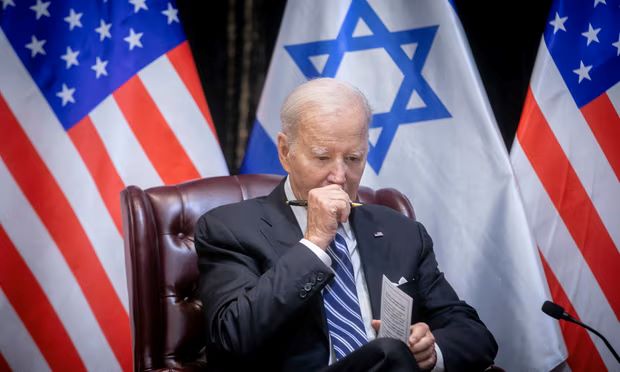Biden adviser plays down differences with Israel over war effort
By Yara Bayoumy
TEL AVIV — Jake Sullivan, President Joe Biden’s national security adviser, on Friday (15) played down differences between the United States and Israel over the war against Hamas in the Gaza Strip, even as Biden has escalated criticism of Israel’s conduct.
A day after Biden administration officials said they wanted Israel to end its large-scale ground and air campaign in Gaza within weeks and transition to more targeted operations against Hamas, Sullivan declined to publicly discuss a timetable, emphasizing that both the United States and Israel expected the pace of the fighting to ultimately slow down. But Israel has maintained that its operations could take “months”.
“When Israel launched this campaign to root out the terrorist threat that Hamas poses to the state of Israel, it made clear from the beginning that this war would proceed in phases,” Sullivan told reporters in Tel Aviv, where he was concluding two days of meetings with Israeli leaders. He added that the next phase of the conflict would be more focused on targeting Hamas’ senior leadership and on intelligence-driven operations, without elaborating on what those would be.
“There’s no contradiction,” Sullivan added, “between saying the fight is going to take months and also saying that different phases will take place at different times over those months, including the transition from the high-intensity operations to more targeted operations,” he said.
Sullivan said the timing and the conditions under which the transition happens were the subject of conversations he had Thursday (14) and Friday with Israeli leaders, including Prime Minister Benjamin Netanyahu and members of his war Cabinet.
“I think it’s really important that those conversations take place, first in the spirit of partnership,” Sullivan said. “We’re not here to tell anybody, ‘You must do X; you must do Y.’” Instead, Sullivan said, US officials were discussing with Israeli officials the ways in which the United States believes Israel can ensure that Hamas does not continue to present a threat while protecting the lives of Gaza’s civilians.
“We are laying out what we believe is the best course forward. We are doing that behind closed doors because we think that’s the best way to achieve convergence around an approach that satisfies those objectives,” Sullivan said.
The conversations around the timeline and conditions for a transition to more targeted operations also had to take place in private, Sullivan said, to avoid telegraphing plans to Hamas.
During their meetings in Israel on Thursday, Israeli leaders presented Sullivan with their own timeline for waging a more targeted offensive — one that was slower than the one favoured by Biden and some of his advisers. Defence Minister Yoav Gallant said before meeting with Sullivan on Thursday that the campaign against Hamas would last “more than several months.”
Biden said this week that Israel was starting to lose international support because of its “indiscriminate bombing” of Gaza, a much harsher assessment than his earlier public statements urging greater care to protect civilians. But White House officials have declined in the days since to repeat Biden’s characterization.
The Biden administration has found itself under pressure at home and abroad to rein in Israel, its closest Middle East ally, as the Palestinian death toll mounts.
Israel launched the war in retaliation for the Hamas-led Oct. 7 attack on southern Israel that killed 1,200 people, Israeli officials say, and saw roughly 240 people taken hostage. Israel has responded with more than two months of bombardment and a ground invasion of Gaza that have killed at least 15,000 people, and likely thousands more, according to Gaza’s health officials, and forced most of the territory’s 2.2 million people to flee their homes.
US officials have emphasized the need for Israel to reduce civilian casualties and ensure the delivery of humanitarian aid as the United Nations warns of increasingly dire conditions in Gaza. Sullivan said Israeli leaders had told him that “their goal is to try to distinguish between innocent Palestinians and Hamas as we go forward.”
Later Friday, Sullivan met in the Israeli-occupied West Bank with Mahmoud Abbas, the Palestinian Authority president, amid widening differences with Israel over post-war scenarios for Gaza.
At his news conference, he repeated the US’ view that Israel should not reoccupy Gaza, from which it withdrew its forces in 2005.
The Biden administration’s urgings to wind down the heavy fighting have gained urgency as the war, now in its third month, threatens to spread in the region and possibly draw in other militant groups that, like Hamas, are supported by Iran.
The Israeli military and Hezbollah, Lebanon’s powerful Iranian-backed militant group, have exchanged cross-border strikes for weeks, prompting Israeli officials to hint at launching a more powerful response. And the Houthi militia in Yemen, which is also backed by Iran, has stepped up attacks against vessels in the Red Sea, a critical corridor for global shipping.
On Israel’s northern border, where missile and drone attacks by Hezbollah have forced civilians to evacuate their homes, Sullivan said Israeli citizens had to be able to return to their homes and feel secure doing so. But Sullivan said the United States believed “that threat can be dealt with through diplomacy and does not require the launching of a new war.”
-New York Times



Comments are closed, but trackbacks and pingbacks are open.